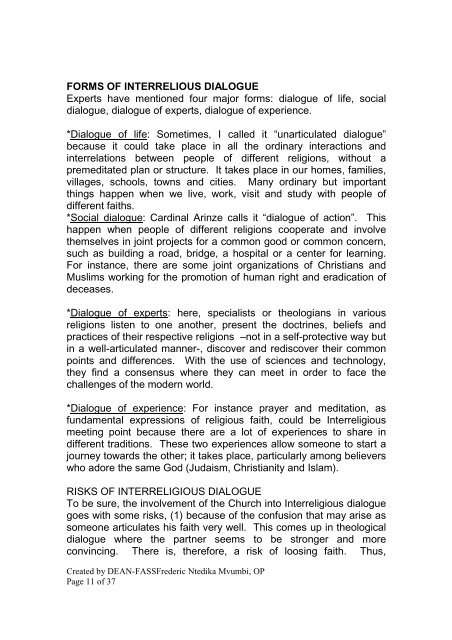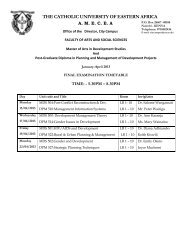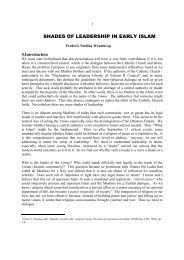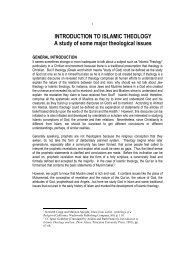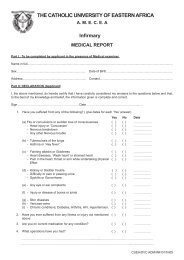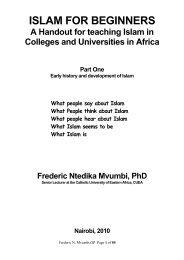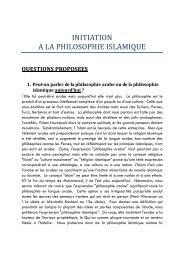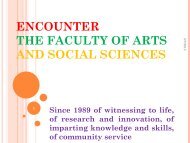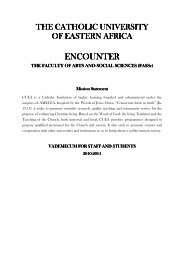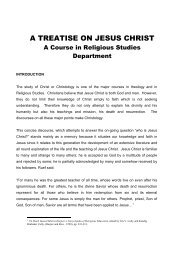PRINCIPLES FOR INTERRELIGIOUS DIALOGUE.pdf - CUEA
PRINCIPLES FOR INTERRELIGIOUS DIALOGUE.pdf - CUEA
PRINCIPLES FOR INTERRELIGIOUS DIALOGUE.pdf - CUEA
You also want an ePaper? Increase the reach of your titles
YUMPU automatically turns print PDFs into web optimized ePapers that Google loves.
<strong>FOR</strong>MS OF INTERRELIOUS <strong>DIALOGUE</strong><br />
Experts have mentioned four major forms: dialogue of life, social<br />
dialogue, dialogue of experts, dialogue of experience.<br />
*Dialogue of life: Sometimes, I called it “unarticulated dialogue”<br />
because it could take place in all the ordinary interactions and<br />
interrelations between people of different religions, without a<br />
premeditated plan or structure. It takes place in our homes, families,<br />
villages, schools, towns and cities. Many ordinary but important<br />
things happen when we live, work, visit and study with people of<br />
different faiths.<br />
*Social dialogue: Cardinal Arinze calls it “dialogue of action”. This<br />
happen when people of different religions cooperate and involve<br />
themselves in joint projects for a common good or common concern,<br />
such as building a road, bridge, a hospital or a center for learning.<br />
For instance, there are some joint organizations of Christians and<br />
Muslims working for the promotion of human right and eradication of<br />
deceases.<br />
*Dialogue of experts: here, specialists or theologians in various<br />
religions listen to one another, present the doctrines, beliefs and<br />
practices of their respective religions –not in a self-protective way but<br />
in a well-articulated manner-, discover and rediscover their common<br />
points and differences. With the use of sciences and technology,<br />
they find a consensus where they can meet in order to face the<br />
challenges of the modern world.<br />
*Dialogue of experience: For instance prayer and meditation, as<br />
fundamental expressions of religious faith, could be Interreligious<br />
meeting point because there are a lot of experiences to share in<br />
different traditions. These two experiences allow someone to start a<br />
journey towards the other; it takes place, particularly among believers<br />
who adore the same God (Judaism, Christianity and Islam).<br />
RISKS OF <strong>INTERRELIGIOUS</strong> <strong>DIALOGUE</strong><br />
To be sure, the involvement of the Church into Interreligious dialogue<br />
goes with some risks, (1) because of the confusion that may arise as<br />
someone articulates his faith very well. This comes up in theological<br />
dialogue where the partner seems to be stronger and more<br />
convincing. There is, therefore, a risk of loosing faith. Thus,<br />
Created by DEAN-FASSFrederic Ntedika Mvumbi, OP<br />
Page 11 of 37


